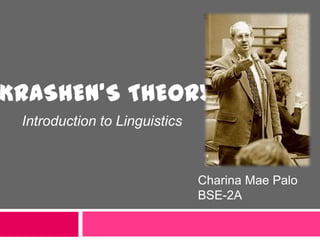Krashen’s theory
Krashen's theory of second language acquisition consists of five main hypotheses: 1) The acquisition-learning hypothesis distinguishes between acquired and learned systems. 2) The monitor hypothesis concerns the use of learned grammar. 3) The natural order hypothesis states that acquisition follows a predictable order. 4) The input hypothesis claims that we acquire by understanding language a little beyond our current level. 5) The affective filter hypothesis embodies that affective variables like motivation and anxiety can impede or facilitate acquisition. The input hypothesis also states that speaking ability emerges over time through comprehensible input, not direct instruction, and the affective filter hypothesis claims learners with positive affect are better equipped for acquisition.

Empfohlen
Empfohlen
Weitere ähnliche Inhalte
Was ist angesagt?
Was ist angesagt? (20)
Andere mochten auch
Andere mochten auch (13)
Ähnlich wie Krashen’s theory
Ähnlich wie Krashen’s theory (20)
Kürzlich hochgeladen
Kürzlich hochgeladen (20)
Krashen’s theory
- 1. KRASHEN’S THEORY Introduction to Linguistics Charina Mae Palo BSE-2A
- 2. I. Brief History About 25 years ago, a psychologist named Stephen Krashen transformed language teaching. He had been developing his ideas over a number of years, but several books he published in the 1980s received widespread acceptance.
- 3. II. Five Hypotheses • The acquisition learning hypothesis • the monitor hypothesis, • the natural order hypothesis, • the input hypothesis, and • the affective filter hypothesis.
- 4. III. The Input Hypothesis We acquire language only when we understand language that contains structure that is “a little beyond” where we are now. This is possible because we use more than our linguistic competence to help us understand.
- 5. The input hypothesis says that we acquire by “going for meaning” first, and as a result, we acquire structure. It also states that speaking fluency cannot be taught directly. It emerges over time, on its own.
- 6. The best way to teach speaking, according to this view, is simply to provide comprehensible input and that is through reading and hearing. Early speech will come when the acquirer feels “ready:” It is typically not grammatically accurate.
- 7. IV. The Affective Filter The Affective Filter hypothesis, embodies Krashen's view that a number of 'affective variables' play a facilitative, but non-causal, role in second language acquisition. These variables include: motivation, self- confidence and anxiety.
- 8. Accuracy develops over time as the acquirer hears and understands more input.
- 9. Low motivation, low self-esteem, and debilitating anxiety can combine to 'raise' the affective filter and form a 'mental block' that prevents comprehensible input from being used for acquisition. In other words, when the filter is 'up' it impedes language acquisition.
- 10. Krashen claims that learners with high motivation, self-confidence, a good self-image, and a low level of anxiety are better equipped for success in second language acquisition.
- 11. IV. The Strength of Affective Filter Teachers try to reduce the learner’s negative feelings. Learners can have higher competence when they receive comprehensible input in low-stress condition.
- 12. INFLUENCES OF THEORIES ON LANGUAGE TEACHING
- 13. What is Language Teaching? It is the teaching of the primary and secondary language.
- 14. I. Theory and Pedagogy Approaches to the teaching of language as school subject which have been highly influenced by socio-linguistics recognised the importance of the active use of language and of allowing pupils to formulate their own responses but have been criticised for reducing the content of lessons to a form of social studies and neglecting the aesthetic dimensions of language. A Framework for Language Education would help users to evaluate the type of emphasis in their own approach.
- 15. It is important, however, to have some understanding of the different debates (some of which have been addressed briefly in this paper) and how theoretical perspectives have influenced them to ensure that thinking is broadened and judgements are appropriately informed.
- 16. THANK YOU! GOD BLESS! ;)
